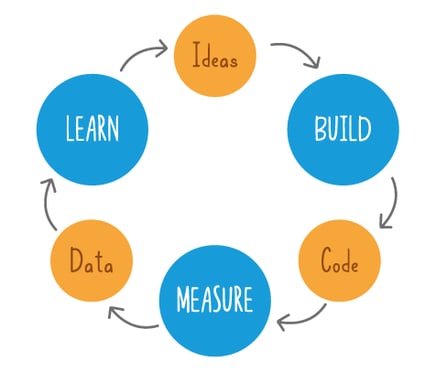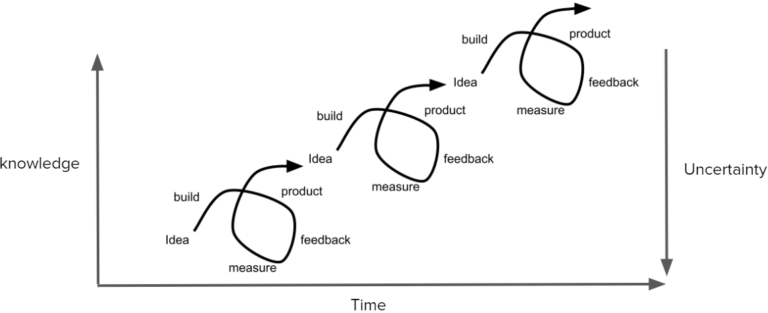Lean Startup

This is the very first blog in our Lean Startup Methodology blog series. In this blog series, we go over Lean Startup Methodology principles and show how these principles help startup founders tackle a variety of risks they face in each step of their startup journey. Let’s start with the very first concept here. A startup.
A Startup
“A startup is a human institution designed to create a new product or service under conditions of extreme uncertainty” – Eric Ries, The Lean Startup.
A startup is “a temporary organization designed to search for a repeatable and scalable business model.” – Steve Blank.
A startup is not a small version of a big company. Startups search for assumptions about the unknown. Existing companies execute what they know. A startup is a live creature, constantly evolving. A startup’s job is not (only) to build a product, but also to:
- Identify and find customers (market discovery)
- Reach out to customers (marketing)
- Convince customers (sales)
- Support customers (operations)
- Continuously rediscover and add value to customers (compete)
There are many misconceptions about startups including:
- Startup is a gamble and founders need to take huge risks to beat the odds.
- My startup situation is different!
- My startup idea is genius! I know my product is going to sell, so there is little risk.
- I’m in a market that’s completely different from markets other startups are in.
A survey, in August 2021, by CBInsights showed:
- 38% of startups failed because they ran out of cash.
- 35% of startups failed because there’s no market need for their services or products.
- 19% of startups failed because they had a flawed business model.
- 14% of startups failed because they didn’t have the right team running the business.
The traditional venture-building process is a gamble. The startup founder must convince himself or herself that their idea is a brilliant one, then develop a detailed business plan based on assumptions and projections. They become aware of their idea and usually self-fund or in rare cases convince investors to fund the idea. They then build a product and launch it, hoping people will use it when they finally discover what customers think, in a moment of truth, and they either succeed or fail.
Lean Startup Methodology
Lean Startup Methodology is the business strategy used by some of the most successful companies to ensure the business will be valid. Developed by Eric Ries and Steve Blank in 2009, this methodology focuses on validating problems and solutions continuously to reduce the risk rather than gambling on business ideas. It increases startup success chances by managing risk systematically through rapid iteration and market discovery.
In a lean startup, founders follow the following principles:
- Start with “the problem” itself.
- Learn what customers really want, not what they say they want or what we think they should want.
- Learn as fast as they can and fail as fast as they can.
- Identify and distinguish assumptions from facts.
- Prioritize assumptions/uncertainties/risks based on their impacts. Founders ask if the uncertainty is a killer or not. Then:
- start with the killer uncertainty,
- experiment to build strong correlations with minimum cost,
- plan to do more experiments.
- Implement their product development in a cycle, not a linear process. The cycle includes the following steps:
- Learn – Results in ideas.
- Build – Results in code (product).
- Measure – Results in data (feedback).

- Reduce the time between Learn > Build > Measure > Learn.
- Get into the cycle as fast as possible.
- Each iteration reduces uncertainty

Dealing with Risks
In our next blog, we will take a look at the risks involved in a startup and how lean startup methodology principles help the founders to reduce the risks.
Contact Us
Learn more about how Nubinary can help your startup come to market through our Fractional CTO service, product development, and more, https://nubinary.com/work-with-us.



